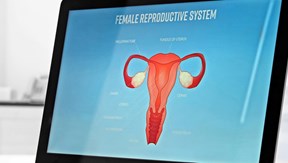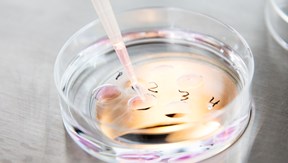Fertility: All about lifestyle and fertility
During the initial conversation prior to insemination or IVF treatment we will among other things discuss lifestyle and fertility with you. Fertility can be measured from the time elapsed from the decision to become pregnant until successful pregnancy. This period varies from couple to couple, generally increases with age. There are however, other factors such as lifestyle and intake of stimulants which can influence the length of the period.

Fertility and Lifestyle
When you come for your consultation before insemination or IVF treatment, we will amongst other things talk about lifestyle and fertility.Fertility is about lifestyle, and there have been a lot of serious investigations that show that fertility increases if we get the right vitamins, exercise and are cautious about stimulants. Lifestyle includes both the choices you make consciously and the more habitual choices, such as smoking and diet, that affect your health and fertility.We know lifestyle is difficult to change, and we won’t moralise, but just give you the best possible information and support to increase your fertility.
Fertility in Connection with Alcohol
In 2001, Statens Serum Institut (SSI) in Denmark completed an investigation of fertility, which concluded that women with low or moderate alcohol consumption do not have lower fertility than women that do not drink alcohol. Low consumption is defined as 0.5 to 2 drinks a week, and moderate consumption as 2.5 to 14 drinks a week.
It is difficult to find other research that documents the connection between alcohol and fertility. Although one should be cautious about generalising on the basis of one investigation, we recommend that you carefully consider your alcohol consumption both when you are trying to become pregnant and when you are pregnant.
In connection with fertility, Statens Serum Institut also investigated the risk of premature birth and spontaneous abortion in connection with alcohol consumption during pregnancy. This investigation showed that the consumption of more than 7 drinks a week resulted in double the risk of premature birth of spontaneous abortion. Women who consume less than 4 drinks a week, however, have no increased risk of premature birth.
Reference: Katrine Albertsen, Anne-Marie Nybo Andersen, Jørn Olsen, and Morten Grønbæk. Alcohol Consumption during Pregnancy and the Risk of Preterm Delivery. Am J Epidemiol. 2004;159:155-161
Caffeine and Fertility
Most of us drink coffee, because the caffeine in coffee gives us an energy boost. Caffeine is found not only in coffee, but also in tea, cocoa, cola, chocolate and energy drinks with guarana and mate. So it is not only coffee you should avoid if you want to be caffeine-free.
A lot of research has been done on the effect of coffee on the organism, and in connection with fertility several investigations suggest that if you consume more than 300 mg. caffeine a day, which corresponds to 4-6 cups of coffee, your fertility is reduced by 35%.
Apart from caffeine, coffee also contains a lot of other substances, some of which have the effect of preventing the uptake of vitamins. That is reason enough for us to recommend that you cut down on your coffee consumption as much as possible, since vitamins have considerable importance for optimising your fertility.
Reference:
Effects of caffeine on human health.
Nawrot P, Jordan S, Eastwood J, Rotstein J, Hugenholtz A, Feeley M.
Toxicological Evaluation Section, Chemical Health Hazard Assessment Division, Bureau of Chemical Safety, Food Directorate, Health Canada, Tunney’s Pasture, PL 2204D1, Ottawa, Ontario, Canada K1A 0L2. 2003
Fertility and Smoking
It cannot be said clearly enough: smoking is always bad for your health. To ensure increased fertility, it is recommended that you try to stop smoking completely, before you start the insemination procedure, or at least cut it down significantly.
Although the wish to become pregnant can be a considerable motivation factor, it can still seem an impossible task to stop smoking. At your first consultation with the mid-wife, she will suggest a plan for reducing your smoking. Acupuncture can help you stop. We have acupuncture specialists in our network.
Fertility is Affected by Vitamins and Folic Acid
The Danish National Food Institute and the Danish National Board of Health recommend that women who want to be pregnant should take a vitamin pill with 400 microgram folic acid daily. Folic acid is a B-vitamin that helps reduce the risk of spina bifida in embryos. Between 22 and 29 days after fertilisation, the neural tube is formed in the embryo, which is almost before you are aware that you are pregnant. The neural tube develops later into the spinal cord and brain. It is recommended that you take folic acid supplement until the 12th week of pregnancy.
Even if you have a varied and healthy diet, we recommend that you take a vitamin pill every day that in addition to the ordinary vitamins also contains folic acid. You can buy vitamin pills that cover your special needs before and during pregnancy in any chemists or pharmacy.
Weight and Fertility
Women’s fertility goes down with increasing weight. This is because the hormone system is disturbed by fatty tissue, which affects hormones important for the menstruation cycle. Overweight can, just like high weight loss, result in menstruation stopping completely. Overweight women also have greater risk of spontaneous abortion.
There are several ways of calculating overweight. One of them is the Body Mass Index. BMI is the ratio between weight and height. It is calculated as your weight in kilos divided by twice your height in metres.
- Normal weight: BMI of 19 – 24
- Slight overweight: BMI of 25 – 29
- Serious overweight: BMI of 30 and over
If you are overweight and would like to improve your fertility, it is a good idea to get the advice of a consultant who can make a diet and exercise plan for you. At Vitanova, you can get help for fertility, diet and exercise planning from our weight consultant, who can draw up a realistic plan for your weight loss in collaboration with you. Infertility

19 FEBRUARY 2024

28 JULY 2023

27 JANUARY 2021

27 JANUARY 2021

27 JANUARY 2021

27 JANUARY 2021

27 JANUARY 2021

27 JANUARY 2021

27 JANUARY 2021

